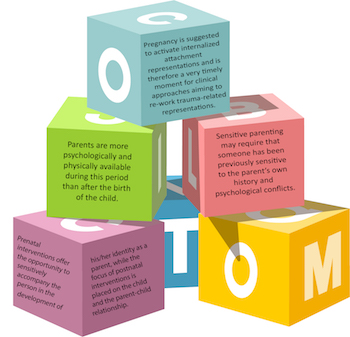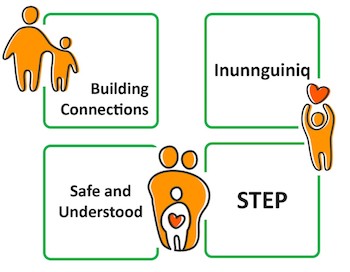Bulletin 8
February 2018

Trauma- and Violence-Informed Parenting Programs To Prevent Child Maltreatment and Improve Mental Health
Parenting programs are regarded as effective interventions to support adults in their parental role and to strengthen their ability to face family and personal challenges in order to reduce the risk of child maltreatment and replace parents’ inappropriate attitudes toward child rearing. They also address mental health issues, such as parental depression and stress (Chen & Chan, 2016).1
The Public Health Agency of Canada’s “Supporting the Health of Victims of Domestic Violence through Community Programs” investment has funded several trauma- and violence- informed parenting programs for men, women and children who have experienced or perpetrated intimate partner violence or child maltreatment. The programs are reaching people at pre- and postnatal stages.
According to Dr. Nicolas Berthelot, Co-investigator of the STEP program,“parenting programs need to be informed by trauma theories, and consider the specific challenges represented by becoming a parent and participating in psychosocial interventions after growing in an environment where his or her own needs or vulnerabilities were not considered or respected.” Dr. Angelique Jenney, Director of the Mothers in Mind Program delivered through Safe & Understood project adds that “there are a lot of myths about parenting out there, and a general lack of child development knowledge that may interfere with a positive parenting process at times.”
So, when it comes to offering parenting programs, is there a right or best time?
Some researchers believe that parenting programs should begin before children are born, while others believe that any time is the right time.
Sooner than later!
 Dr. Berthelot suggests that pregnancy is a particularly good time to intervene with parents exposed to trauma. He offers a rationale for offering parenting programs to expecting parents who have experienced maltreatment:
Dr. Berthelot suggests that pregnancy is a particularly good time to intervene with parents exposed to trauma. He offers a rationale for offering parenting programs to expecting parents who have experienced maltreatment:

Dr. Berthelot adds that “intervening early in the postnatal period may be already late as intergenerational impacts of childhood maltreatment are observed very early after the child’s birth, which implies that postnatal interventions may be more therapeutic than preventive.”
 Dr. Katreena Scott, Director of the Caring Dads program delivered through the Safe and Understood project agrees that sooner is better than later. “It would be so great to get to men before they have harmed their partners and children. I would love to see much more prevention work with adolescents and also with young adults moving into marriages and into parenting.” Dr. Scott adds that “too often, the dads who come into our program say that this is the first time that they have talked about being a dad with other men. I would love to find ways to support men in having these kind of conversations much earlier."
Dr. Katreena Scott, Director of the Caring Dads program delivered through the Safe and Understood project agrees that sooner is better than later. “It would be so great to get to men before they have harmed their partners and children. I would love to see much more prevention work with adolescents and also with young adults moving into marriages and into parenting.” Dr. Scott adds that “too often, the dads who come into our program say that this is the first time that they have talked about being a dad with other men. I would love to find ways to support men in having these kind of conversations much earlier."
Dr. Scott explains that the Caring Dads program is working with fathers who have already behaved in ways that have been harmful to their children and/or their children's mothers. “We chose to focus on these particular fathers because of the harm that they have, and often will continue, to have as a result of their perpetration of abuse in their families. And because no one else is doing this work!”
Parenting is a Journey of Lifelong Learning!
 Dr. Gwen Healey and Dr. Angelique Jenney believe that any time is the right time to offer a parenting program, and that it is completely dependent on a person’s particular circumstance as to when they might benefit the most from the intervention.
Dr. Gwen Healey and Dr. Angelique Jenney believe that any time is the right time to offer a parenting program, and that it is completely dependent on a person’s particular circumstance as to when they might benefit the most from the intervention.
According to Dr. Jenney, “A parent who attends in a state of crisis may have gotten more out of the program had they attended during a non- crisis time - however, the group itself may have provided the support and structure they were looking for that assisted with the crisis.”
Dr. Jenney recommends that “moms participate when they feel they can safely attend the program and focus on the content. Mothers should never be mandated to attend a therapeutic parenting program, positive engagement is the key to good outcomes.”
 Dr. Healey, Principal Investigator of the Inunnguiniq program shares that, “some people have attended multiple times because they are in a different place every time they take it. They see something new in the materials, their kids are older and have different needs, their lives have changed and taking it again helps them see it in a new light. This type of learning is a lifelong process. We are never completely capable in this material until we become elders. Once we all realize that it's a journey of lifelong learning, it becomes easier to see our decisions as part of a contin- uum, and that every moment is the right moment.”
Dr. Healey, Principal Investigator of the Inunnguiniq program shares that, “some people have attended multiple times because they are in a different place every time they take it. They see something new in the materials, their kids are older and have different needs, their lives have changed and taking it again helps them see it in a new light. This type of learning is a lifelong process. We are never completely capable in this material until we become elders. Once we all realize that it's a journey of lifelong learning, it becomes easier to see our decisions as part of a contin- uum, and that every moment is the right moment.”
What do our experts recommend for successful implementation of trauma– and violence informed parenting programs?
Our experts offer the following recommendations:
- Build trust and establish emotional safety.
- Understand the cultural needs and experiences of those attending the group.
- Acknowledge the diverse needs of participants based on age, socioeconomic status, mental health, and other intersecting dimensions.
- Provide choice and find ways to empower parents to create safety and well-being for children.
- Focus on opportunities for self development rather than skill deficit.
- Group leaders should act as facilitators to en- courage shared learning among participants.
Feedback from participants…
“It blew my mind! I had never thought that way. And it changes everything. In every decision now, I think - what will this be like for my kids. It opened my eyes. Once you start to see, there is no way to ever go back". A Caring Dads program participant.
“After about a year of piloting, we started getting feedback from families about how their children were doing at home - we were just so happy and full of joy to see the outcomes we had all hoped for coming to fruition, it was really having an impact on parents and children. It's the incredible rewarding experience to be able to serve our community in this way.” Dr. Gwen Healey, Inunnguiniq.
These trauma-and violence-informed parenting programs are being delivered across Canada and are still being evaluated. Stay tuned for results of these programs as they approach completion in 2020/21.
Trauma- and Violence-Informed Parenting Programs:
Building Connections
Through this project, the Canadian Mothercraf t Society is helping mothers experiencing family violence learn about the impacts of violence on their parenting and their children’s development, while building mothers’ self-esteem and improving their positive parenting and healthy relationship skills.
Inunnguiniq Parenting Program
The Qaujigiartiit Health Research Centre in Nunavut is adapting and evaluating the Inunnguiniq Parenting Program for high-risk parents and caregivers who are involved in the criminal justice system, accessing social services, and/or are in treatment for substance abuse.
Safe and Understood
Led by the Child Development Institute, the Safe and Understood project expands the reach of two existing programs – Caring Dads and Mothers in Mind. These programs for parents with experiences of family violence build skills to manage stress, enhance self-esteem, and support the social, emotional and developmental health of their children.
This project is led by the Center for Interdisciplinary Studies on Child and Family Development (CEIDEF) at the Université du Québec à Trois-Rivières. It is developing and evaluating a group intervention for expecting parents who have experienced trauma/violence/abuse during their childhood.

What's New
The Knowledge Hub Welcomes the Collaborative Approaches for Supporting Survivors of Female Genital Mutilation/Cutting (FGM/C) Project!
Led by the Women’s Health in Women’s Hands Community Health Centre, this project will engage survivors of FGM/C, community leaders, service providers and the media to educate, sensitize and enhance supports for survivors and those at risk of FGM/C.
The project will take place within the Greater Toronto Area with a focus on neighborhoods which have the highest concentration of racialized communities greatly impacted by FGM/C.
Community consultations and the dissemination of resources will take place at both the provincial and national level, building on the partnerships and networks already established by Women’s Health in Women’s Hands Community Health Centre.
Welcome Notisha Massaquo and Wangari Tharao to the trauma– and violence-informed health promotion community of practice!
Member Profile
 “I am the lead of the evaluation team for the Bounce Back League (BBL) which is a project that aims to increase the physical and mental health of members of the Boys and Girls Clubs through trauma-informed sport programming. I am currently the Associate Director of the School of Health and Exercise Sciences at UBC Okanagan’s campus and prior to this was at the University of Ottawa. Just over 10 years ago, while in Ottawa, I began to volunteer with the Boys and Girls Club of Ottawa to help develop, evaluate and enhance the youth programs and I am excited to continue this work with the Boys and Girls Club of Canada as well as the Okanagan Boys and Girls Club. Outside of my work, I enjoy spending time with family, skiing, mountain biking and exploring nature.”
“I am the lead of the evaluation team for the Bounce Back League (BBL) which is a project that aims to increase the physical and mental health of members of the Boys and Girls Clubs through trauma-informed sport programming. I am currently the Associate Director of the School of Health and Exercise Sciences at UBC Okanagan’s campus and prior to this was at the University of Ottawa. Just over 10 years ago, while in Ottawa, I began to volunteer with the Boys and Girls Club of Ottawa to help develop, evaluate and enhance the youth programs and I am excited to continue this work with the Boys and Girls Club of Canada as well as the Okanagan Boys and Girls Club. Outside of my work, I enjoy spending time with family, skiing, mountain biking and exploring nature.”
Knowledge Hub Upcoming Events
Working Group Meeting in London, ON
The working group focused on developing ethical principles for trauma– and violence-informed research will be meeting in London, ON March 14-15, 2018 to to develop a product on enhanced ethical guidelines.
Knowledge Exchange in Toronto, ON
The next Hub Knowledge Exchange for the Trauma– and Violence Informed Health Promotion Community of Practice will take place May 23-24, 2018 in Toronto, ON at the Marriott Hotel by Toronto Pearson Airport.
Resources
A Systematic Review of Interventions for Women Parenting in the Context of Intimate Partner Violence
Austin, A., Shanahan, M., Barrios, Y., Macy, R. (2017). A Systematic Review of Interventions for Women Parenting in the Context of Intimate Partner Violence. Trauma, Violence, & Abuse. DOI: 10.1177/1524838017719233
‘Breaking the Cycle’ of maternal substance use through relationships: a comparison of integrated approaches
Espinet, S. D., Motz, M., Jeong, J. J., Jenkins, J. M., & Pepler, D. (2016). ‘Breaking the Cycle’ of maternal substance use through relationships: a comparison of integrated approaches. Addiction Research & Theory, 24(5), 375-388. doi:10.3109/16066359.2016.1140148
Conducting evaluation research with children exposed to violence: How technological innovations in methodologies and data collection may enhance the process
Wall, M. A., Jenney, A., & Walsh, M. (2018). Conducting evalua- tion research with children exposed to violence: How technological innovations in methodologies and data collection may enhance the process. Child Abuse & Neglect. doi:10.1016/j.chiabu.2018.01.007
Psychometric Evaluation of the interRAI Child and Youth Mental Health Disruptive/Aggression Behaviour Scale (DABS) and Hyperactive/Distraction Scale (HDS)
Lau, C., Stewart, S. L., Saklofske, D. H., Tremblay, P. F., & Hirdes, J. (2017). Psychometric Evaluation of the interRAI Child and Youth Mental Health Disruptive/Aggression Behaviour Scale (DABS) and Hyperactive/Distraction Scale (HDS). Child Psychiatry & Human Development. doi:10.1007/s10578-017-0751-y
Missing & Murdered Indigenous Women
Date & Time: Tuesday, March 20, 2018 | 1:00 to 2:15 PM EST Presented by: Cheryl Bagnall and Tamara Bernard, Ontario Native Women’s Association
This presentation will speak to the issue of MMIW from an Indigenous Women’s perspective as both family and community members. It will also inform on how ONWA does this work to support the families of Missing and Murdered Indigenous Women with a focus on the importance of ceremony and how it is a vital component of healing for families who have lost someone.
Knowledge Hub Team
Linda Baker, Sara Mohamed, Anna-Lee Straatman, Jassamine Tabibi
We would love to hear from you!
Contact us: smoha84@uwo.ca
Check us out on Social Media:
Facebook: facebook.com/TheLearningNetwork
Twitter: twitter.com/learntoendabuse
